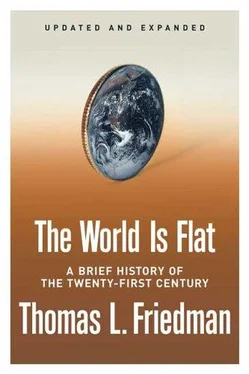“These were big ideas,” noted Romer, “and what is missing at the moment is a political imagination of how do we do something just as big and just as important for the transition into the twenty-first century as we did for the nineteenth and twentieth.” The obvious challenge, Romer added, is to make tertiary education, if not compulsory, then government-subsidized for at least two years, whether it is at a state university, a community college, or a technical school. Tertiary education is more critical the flatter the world gets, because technology will be churning old jobs, and spawning new, more complex ones, much faster than during the transition from the agricultural economy to the industrial one.
Educating more people at the tertiary level has two effects. One is that it produces more people with the skills to claim higher-value-added work in the new niches. And two, it shrinks the pool of people able to do lower-skilled work, from road maintenance to home repair to Starbucks. By shrinking the pool of lower-skilled workers, we help to stabilize their wages (provided we control immigration), because there are fewer people available to do those jobs. It is not an accident that plumbers can charge $75 an hour in major urban areas or that good housekeepers or cooks are hard to find.
America's ability from the mid-nineteenth century on into the midtwentieth century to train people, limit immigration, and make low-skilled work scarce enough to win decent wages was how we created a middle class without too disparate an income gap. “Indeed,” noted Romer, “from the end of the nineteenth century to the middle of the twentieth, we had a narrowing of the income gap. Now we have seen an increase of that gap over the last twenty or thirty years. That is telling us that you have to run faster in order to stay in the same place.” With each advance in technology and increase in the complexity of services, you need an even higher level of skills to do the new jobs. Moving from being a farmhand to a phone operator who spoke proper English and could be polite was one thing. But moving from being a phone operator after the job got outsourced to India, to being able to install or repair phone-mail systems-or write their software—requires a whole new leap upward.
While expanding research universities on the high end of the spectrum is important, so is expanding the availability of technical schools and community colleges. Everyone should have a chance to be educated beyond high school. Otherwise upper-income kids will get those skills and their slice, and the lower-income kids will never get a chance. We have to increase the government subsidies that make it possible for more and more kids to attend community colleges and more and more low-skilled workers to get retrained.
JFK wanted to put a man on the moon. My vision is to put every American man or woman on a campus.
Employers have a critical contribution to make to lifetime learning and fostering employability, as opposed to guaranteed employment. Take, for instance, CapitalOne, the global credit card company, which began outsourcing elements of its backroom operations to Wipro and Infosys in India over the past few years. Competing in the global financial services market, the company felt it had to take advantage of all the cost-saving opportunities that its competitors were. CapitalOne began, though, by trying to educate its workers through workshops about the company's competitive predicament. It made clear that there is no safe haven where lifetime employment is possible anymore -inside Capital-One or outside. Then it developed a whole program for cross-training of computer programmers, those most affected by outsourcing. The company would take a programmer who specialized in mainframes and teach him or her to be a distributed systems programmer as well. CapitalOne did similar cross-training on its business side, in everything from auto loans to risk management. As a result, the workers who were eventually let go in an outsourcing move were in a much better position to get new jobs, because they were cross-trained and therefore more employable. And those who were cross-trained but retained were more versatile and therefore more valuable to CapitalOne, because they could do multiple tasks.
What CapitalOne was doing, out of both its own self-interest and a feeling of obligation to workers it was letting go, was trying to make more and more of its workers into versatilists. The word “versatilist” was coined by Gartner Inc., the technology consultants, to describe the trend in the information technology world away from specialization and toward employees who are more adaptable and versatile. Building employee versatility and finding employees who already are or are willing to become versatilists “will be the new watchword for career planning,” according to a Gartner study quoted by TechRepublic.com. “Enterprises that focus on technical aptitude alone will fail to align workforce performance with business value,” the Gartner study said. “Instead, they need to build a team of versatilists who build a rich portfolio of knowledge and competencies to fuel [multiple] business objectives.” The Gartner study noted that “specialists generally have deep skills and narrow scope, giving them expertise that is recognized by peers but seldom valued outside their immediate domain. Generalists have broad scope and shallow skills, enabling them to respond or act reasonably quickly but often without gaining or demonstrating the confidence of their partners or customers. Versatilists, in contrast, apply depth of skill to a progressively widening scope of situations and experiences, gaining new competencies, building relationships, and assuming new roles.” TechRepublic quoted Joe Santana, director of training at Siemens Business Services: “With flat or even smaller budgets and fewer people, managers need to make the most of the people they have... They can no longer see people as specialty tools. And their people need to become less like specialty tools and more like Swiss Army knives. Those 'Swiss Army knives' are the versatilists.”
In addition to their own self-interest in making more of their own employees into human Swiss Army knives, companies should be encouraged, with government subsidies or tax incentives, to offer as wide an array as possible of in-house learning opportunities. The menu of Internet-based worker-training programs today is enormous-from online degree programs to in-house guided training for different specializations. Not only is the menu enormous, but the cost to the company for offering these educational options is very low. The more lifetime learning opportunities that companies provide, the more they are both widening the skill base of their own workforce and fulfilling a moral obligation to workers whose jobs are outsourced to see to it that they leave more employable than they came. If there is a new social contract implicit between employers and employees today, it should be this: You give me your labor, and I will guarantee that as long as you work here, I will give you every opportunity-through either career advancement or training— to become more employable, more versatile.
While we need to redouble our efforts to build the muscles of each individual
American, we have to continue to import muscles from abroad as well. Most of the Indian, Chinese, Russian, Japanese, Korean, Iranian, Arab, and Israeli engineers, physicists, and scientists who come to work or study in the United States make great citizens. They are family-oriented, educated, and hardworking, and most would jump at the chance to become an American. They are exactly the type of people this country needs, and we cannot let the FBI, CIA, and Homeland Security, in their zeal to keep out the next Mohammed Atta, also keep out the next Sergey Brin, one of the cofounders of Google, who was born in Russia. As a computer architect friend of mine says, “If a foreign-born person is one day going to take my job, I'd prefer they be American citizens helping pay for my retirement benefits.”
Читать дальше












